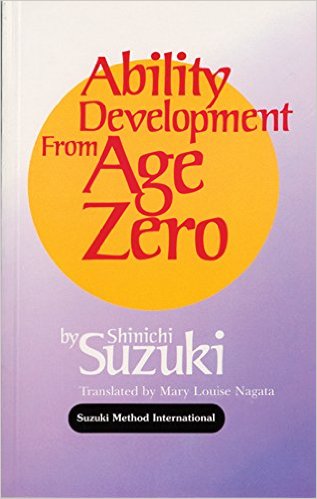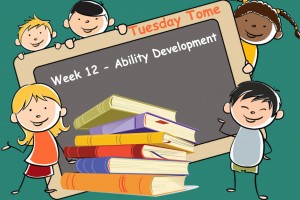Ability Development from Age Zero by Shinichi Suzuki is required reading for Suzuki parents, those of us who put our children through music lessons with a Suzuki-certified teacher. My children take violin lessons from a Suzuki teacher and so I read this book as part of my preparation to support the teacher in her goals and methods.
First off, this is a short book – only 96 pages. Even if you read only 14 pages per day (that’s turning the page only seven times, friends!) you should be able to cover it in one week. By the way, when a book gets boring, I tell myself I have to turn the page only five more times and then I will put it down. Or something similar. Because motivation to finish something does not come easy, but if I can focus on a short-term goal, that does not seem daunting, I feel better about the task at hand.
This book does not get boring very often though. There are stories and anecdotes about different parents and children who are using the Suzuki method. There is some repetition in it, but I suppose it is a good thing. I know I need some concepts drilled into me and it only happens by hearing them over and over again.
Here are some powerful concepts from this book:
- Children can learn ability, they can develop talent.
- They are a product of their environment.
- After a child practices a piece, tell her “That was good! Can you do it better?” By the way, I tried it with my children and it works! They love to try again, to strive to do it better.
- Anger is not necessary. When dealing with children, some parents behave like half-wolves (a reference to stories about wolves raising human babies). We must put away anger as we parent our children and become civilized, as Mr. Suzuki puts it.
- Start an Anger Chart. Daily, record who loses their temper and how many times. We did, in our household, and the result surprised all of us. I surely did not want to get on the Anger Chart, so I have kept my temper in check so far. We will see how long it lasts. One of my children complains about the chart and I think you can guess why. It’s because they have an anger problem. It holds them accountable.
- Parents are haughty. We really need to humble ourselves as we deal with our children and realize they are who they are because of what we have done to them. Do you have an obstinate child? It’s because you have given in to that child consistently. Now the child thinks she can get away with their own will. Do you have an angry child? Maybe he is simply mirroring your behavior. Is your child lazy? Look at your own lifestyle and schedule.
- Let your prayer be a “thank you.” My husband has told me this many times and, apparently, Mr. Suzuki agrees. (My husband is 99% right and I love it! It’s why I married him.) If our hearts are truly thankful for everything in our lives, we do not need to ask for things in our prayers. I know Mr. Suzuki comes from a Buddhist perspective. On the other hand, Jesus has encouraged us to ask, Paul exhorts us to come boldly to the throne of grace etc. However, gratefulness in the heart lies at the foundation of a harmonious person, one who can turn around and produce beautiful music to enrich the lives of others.
These are just highlights of the wonderful concepts which make up the Suzuki method or the Talent Education Movement started by Shinichi Suzuki. I count myself blessed for having read this book and look forward to reading the other two titles on my “Suzuki Parent Required Reading List.”

